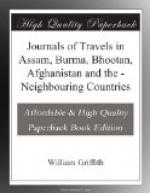“I have obtained some few specimens of fossil shells from the shingly beds of the Khyber Pass. They seem to be a Spirifer with a very square base, quite different from the common species of the Bolan Pass, which is like a large cockle, and of which I have one beautiful specimen. How I regret not seeing Bukkur, for with a few days’ leisure, a number of fossils might be obtained. The older I grow the less content am I scientifically: would that I had received a mathematical education. I was much interested with some quotations from Lyell’s Elements in a late Calcutta Courier, especially about the Marine Saurian from the Gallepagos. What further proof can be wanted of the maritime and insular nature of the world during the reigns of the Saurian reptiles? What more conclusive can be expected about the appearance of new species? This point would at once be settled if the formation of these islands can be proved not to have been contemporaneous with the Continents. Then the animal nature of chalk!
“I am doing nothing in botany, but learning Persian, and the use of the theodolite, with nothing but difficulties to look at all around. I begin to feel of such importance, (do not think me conceited in relation to my collections and information on geographical botany,) that I am not overpleased with the idea of facing dangers alone: however I suppose every thing is as usual exaggerated.”
* * * * *
Bamean: August 3rd, 1840.
“Yesterday I crossed the Hindoo-koosh by my former route, and this morning while out, i.e. trout fishing, was most agreeably interrupted by the post. The fishing was ended forthwith. Indeed the sun in this country even at elevations of 12,000 feet is very hot, and has excoriated my hands, beautifully white as they were after my sickness, but not before I had caught 3 barbels, evidently different from those of the other side of the range. I caught some trout yesterday evening, it is a most beautiful fish, I was particularly struck with the size of the eye, its prominence, and expressive pupil, in opposition to the sluggishness of the eyes of carps.
“It is strange that Botany has always been the most favoured of the natural sciences, it is strange that in spite of what all do say it is the least advanced of any. How can I reconcile my own splendid opportunities with those of more deserving naturalists in other branches? and I would willingly share them on the principle of common fairness with others, who I know would turn them to a better account. Oreinus takes the worm greedily; in the Helmund, 11,000 feet above the sea, it is abundant. It is the same species I think as that in the Cabul river; but in the Cabul river, Barbus is the predominant fish: in the Helmund it is the reverse. How can one account for the small elevation at which fish are found in the Himalayan? I cannot imagine it is owing as some think to the relative impetuosity of the rivers, which after all is only an assumption.




